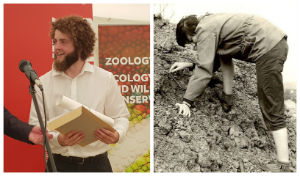Graduate scientist given inaugural fossil research award in honour of unsung hero
16 July 2019

An award named after a University of Reading student, whose discovery of the earliest known multicellular life was ignored for almost 50 years, has been presented to its first recipient at this summer’s Graduation.
Tina Negus discovered a fern-shaped fossil that was twice as old as the earliest dinosaurs as a teenager in 1956. However, this discovery was not acknowledged until 2004, long after the Charnia masoni fossil had been found, and named after, someone else.
The inaugural Tina Negus Prize was presented at the University of Reading Graduation ceremony on Tuesday 16 July, to a Biological Sciences student who made his own discovery about post-dinosaur life during his studies.
Jake Brendish, 22, conducted a study of paravians – a group that links dinosaurs and modern birds as part of research into why the tropics are home to so many different species today. He found that the distribution of their fossils around the world suggested they lived in milder climates, much further from the equator than similar groups of species.
On receiving the prize, Jake said: “It's great to know that someone who went unrecognised for such a major discovery is finally getting some measure of acknowledgement for their work. Hopefully we're reaching the point where the right people are credited regardless of their background and demographics. I think retrospective acknowledgement is a big part of that.
“The research project was the highlight of the course for me and I owe a lot to everyone who helped. In particular, I have to thank my supervisor, Dr Brian Pickles, whose expertise and much appreciated patience were a huge boost to the project.”
Tina's story
Tina found the Charnia fossil in a quarry in Charnwood Forest, Leicestershire, but the rubbing she took was dismissed as impossible by her school teacher. The fern is thought to have existed on the sea floor in deep water around 560 million years ago, making it the earliest evidence of life on Earth at the time.
In 1961, Tina presented her rubbing to member of the Geology department at the University of Reading while she was studying Zoology, Botany and Geography. It was then she learnt that it had been discovered and named after schoolboy Roger Mason in 1958 who had found the same fossil a year after her.
Recognition for the part Tina, now an artist and poet, played in the discovery did not come until 2004, when she made contact with Roger after seeing him speak in a documentary. She was invited to be part of the 50th anniversary celebrations of the discovery and her contribution is now credited.
The Tina Negus award will be presented annually for best undergraduate research in palaeontology by the School of Biological Sciences, after Tina granted them permission to name the new prize after her.
'Genuine contributions to science'
Dr Louise Johnson, from the School of Biological Sciences at the University of Reading, said: “Jake’s creativity, enthusiasm and hard work make him a really deserving recipient of this award. Tina’s discovery was one of the most spectacular in the history of palaeontology. The fossil Tina found rewrote the history of life on earth, and we still haven’t completely solved the mystery behind it. It could be a very early animal related to today’s jellyfish, or even a completely different kind of life on Earth that’s now gone extinct.
“We’re particularly delighted to celebrate Tina, partly because she’s an amazing role model who shows how art and science can inspire each other, but also because she made her discovery as a young person. She proves that the most important entry qualifications for a scientist are enthusiasm, curiosity and an open mind.
“We want all young people, especially our students, to be aware of that, and so we work hard to provide the best opportunities for our students to get involved in cutting edge research and scientific discovery. Our students work with world-leading scientists, giving them the chance to make genuine contributions to science during their time at Reading, whatever they go on to do afterwards.”
In the latest National Student Survey, Biological Science scored 90% for satisfaction among students, while Zooology scored 96%.
Recent research carried out at the School of Biological Sciences includes a discovery that the dinosaurs were already in decline before the asteroid strike that is credited with wiping them out, PhD research that revealed the dinosaurs spread to takeover the world so quickly that it could have contributed to their demise, and a study showing that microplastics can transfer from mosquito larvae to the flying adult, carrying plastic pollution into the food chain.
